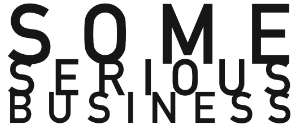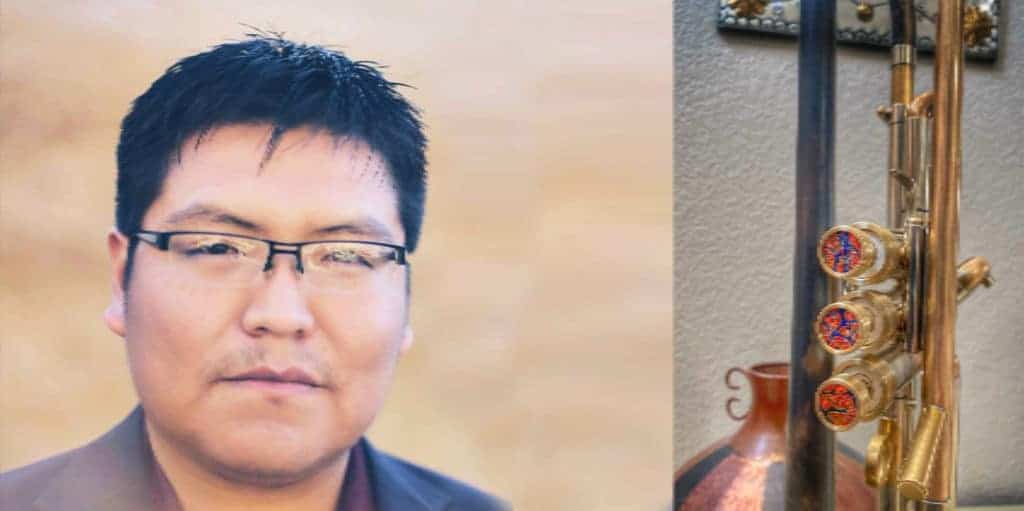DINÉ TRUMPET PLAYER DELBERT ANDERSON ANSWERS SOME OF OUR #FIFTYQUESTIONS
Anderson’s music expresses Diné culture through melodies inspired by ancient songs of love and war while fusing them with modern jazz and funk. —“Earthsongs”, NPR
Delbert is the recipient of numerous awards including 2021 Chamber Music America Jazz Presenters Consortium Award; 2021 Emerging Leaders by Western Arts Federation; 2019 Native Launchpad Award from the Western Arts Alliance Advancing Indigenous People (AIP) program; the 2018 Trumpet Consortium Program from the University of Colorado, Boulder; the 2018, Connie Gotsch Arts Foundation award. He plans to spend his time in Abiquiu developing a tribute to Don Cherry, physical and spiritual reflection, and considering how his work can be used to positively combat cultural inequity.
Delbert Anderson is a rising trumpet star in the music world who combines a mastery of his craft with the unique ability to express himself in multiple genres. He is a man ahead of his time…He reaches deep down into his soul and brings his audiences to the point of communal and joyous rapture. —Rodney Marsalis
What event or factor in your life has been most pivotal in your decision to become an artist?
In 4th grade, a jazz combo came to our school to help demonstrate musical instruments. The very next day we got to choose which instrument we wanted to play. What caught my attention—and to this day brings me hope and enjoyment—was the musicians’ skill at improvisation. The gentleman who played the trombone turned his music stand around and began to play without sheet music! He kept going and going, and I was in amazement. The next day, I tried to play the trombone but wasn’t able to make any notes—so they asked me to try the trumpet. I blew a few notes on the trumpet and decided to stick with it!
What artist do you consider most influential to your ongoing artistic development?
My influence in music mainly came from an experience with my elementary-school teacher. Her name is Janet Isham, and one day I attended band practice early and started to play our musical exercises. She said I played them perfectly and asked if I could demonstrate for the class. I said yes. She said I was one of the best players she had. I was only seventh chair at the time, but after her encouragement I moved ahead and was first chair until college! I then met three professors who would teach me how to navigate music and business: Dr. John Kennedy, my very first trumpet professor in college; Dr. Christopher Beaty, my first jazz teacher; and Mr. Dustin Seifert, my college-band director. With all of their teachings combined, I was able to make a career for myself and work on my development consistently.
What has been the most significant challenge you’ve faced in continuing your art practice?
One of the biggest challenges was—and still is—supporting a family of seven. Ha-ha, I have a wife and five children. Many factors are against having a music career, but the number-one problem is money. It’s rare to meet full-time artists. I was lucky enough to have a mentor who taught me how to make the switch from being a full-time hospital employee to doing what I loved. It was a hard, long process of three years, but I was able to make a jump in the right direction. I will never forget those three years because they were a time in my life during which I nearly quit music and educating!
Describe your ideal workspace.
There are 5 things I must have: a laptop, my trumpet, a piano, audio speakers, and coffee!
What sentence do you hope describes how your art practice will be recorded in history, and why?
“Anderson’s sound and ethics bring healing to the past, present and future.” I truly hope to have an impact on this earth. Not necessarily as a musician but as a person who healed others with my music, way of life, and positive messages.
In thinking of the lulls and gaps or lost places in your practice over the years, who or what has reenergized you?
I always look to my own family to revive myself. In fact, a big part of my music career jump-started because I had my family’s support, which made me feel confident and made things work. There is nothing like good old-fashioned family support to meet your goals.
What project do you consider most satisfying, regardless of external support or accolades?
The making of the trio has been my most satisfying project. It gave me a solid foundation for growth. All of my projects hover around the trio. Each project has the trio as the base of its creation.
What are habitual internal fears and bogeymen that come up for you around making art—excluding universal concerns of time, space, money, inadequacy, and recognition?
One of the hard things, for me, is keeping my family at the forefront. It’s easy to forget one’s foundation—in my case, my family—while being away from home or getting into an artistic mode. If I’m not careful, it sometimes feels that music is my priority.
Of all the artists who have ever lived, who would you most love to share your work with? And why?
I believe it would’ve been a fun time to share some of my compositions with Lee Morgan. I think he might have dug some of the melodies that came from my cultural background. I also believe our characters might be similar. At least enough to get along, ha-ha!
If you could travel in time, within what era or milieu would you most like to have had an artist residency? And why?
I think I would’ve enjoyed an artist residency in the 40s, mainly because jazz was becoming pop music. The jazz greats were certainly in their prime with innovation and beginning to develop a model for the music.
What is your current guiding motivation to work or express yourself?
My guiding motivation is my family. It determines whether I take a performance or not. If it’s beneficial to the family, I take the gig. If it’s not beneficial to the family, I decline. When your family trusts you to do well, as artists we need to care for that relationship. The moment I start doing things that do not benefit the well-being of my family, things start to fail. This can involve finances, trust, etc. When the family is behind me and encourages my art, I feel very stable and more able to express myself artistically.
Who or what would you most like to collaborate with?
I’ve always thought collaborating with an orchestra or symphony would be amazing. In 2016 we collaborated with the Eastern New Mexico University Wind Symphony. It was amazing and everything I could imagine. Playing along with a great symphony—hearing your original music being performed—makes you feel like you have so much power, especially with the backing of great musicians.
Do you have a relationship with the distant future? In other words, are you making artwork that bears a message or impact for coming generations?
I always spread the message that having a career in music is possible for those who are willing to do the work. Lately, my message has been focused on the healing aspect within the music we play. It can be beneficial to everyone who listens in the right mindset.
What role does your genetic or cultural background play in your practice?
My cultural background—Diné music—is our foundation. My Navajo Spinning songs set us apart from the rest.
What surprises you the most about your current practice? If the nine-year-old you could see you now, what would he think?
I’m very surprised I’m able to have a career in music. I never thought I’d make it this far. My nine-year-old self wouldn’t believe that I have such a big family, and music as my job. It’s almost a fairy tale!
What do you worry not ever being able to express?
I don’t think I might be able to express how important and connected art is to our daily lives. Our values are influenced by what we touch, smell, and love. If you do well and care for your family, your family does well. When your family does well, your job does well. When your job does well, your creativity strengthens. You become a strong individual on all levels. The moment a part of this chain declines, other things begin to fall with that weakness. It’s so important to be understanding, caring, polite, trustworthy, responsible, and respectful to the ethics of being healthy, going to bed on time, rising early, planning, and never losing sight of the main purpose of your life. Like Avotcja says: “My profession is not something I do, it’s what I live.”
What emotion makes you most uncomfortable as an artist, and why?
I feel very uncomfortable with the feeling of “professional meets unprofessional”: when many emotions combine into one, bringing a lot of uncertainty. A part of you feels over-professional. You don’t feel respected. Another part of you feels you shouldn’t have taken the gig. You start to draw conclusions on your entire experience. It’s hard to deal with these emotions.
Can you recall your first memory of bliss in self-expression?
In 2019 while performing near the ocean in Sitka, Alaska: it was evening, so calm with perfect weather. You could see the sunset, and we were about to start our show. I looked over to my fellow band mates and had this expression of total rest and calm. I was super happy and excited, yet I couldn’t believe our music had taken us that far.
About Delbert Anderson
Delbert Anderson is a Diné trumpet artist, composer and educator who attended Eastern New Mexico University studying Music Education and Performance. Anderson is the Jazz Director at San Juan College, founder of the San Juan Jazz Society and is credited as a Native American Music Ambassador. The music of Anderson is inspired through his Navajo cultural background and fused with influences of jazz, funk, hip hop and Southwestern styles. Anderson has created experimental educational programs and is known as an arts project developer. He also serves as a national and international arts consultant specializing in community development. Anderson has performed and worked with some of today’s top music professionals such as Phil Manzanera, Jon Faddis, TS Monk, Bobby Watson, John Lindemann (2x Grammy Winning Producer) and more. Anderson continues his mission of creating opportunities in the arts, educating Native American youth and sharing messages of hope, life and positivity.

